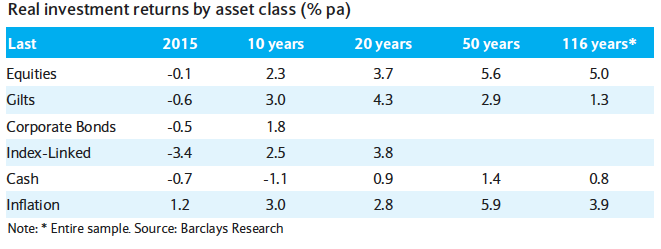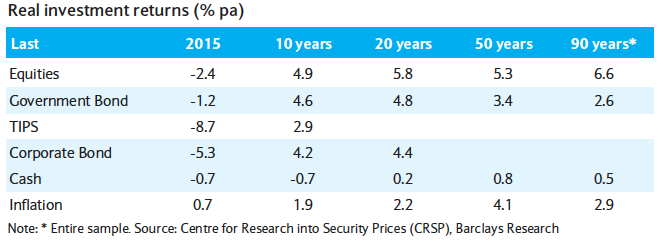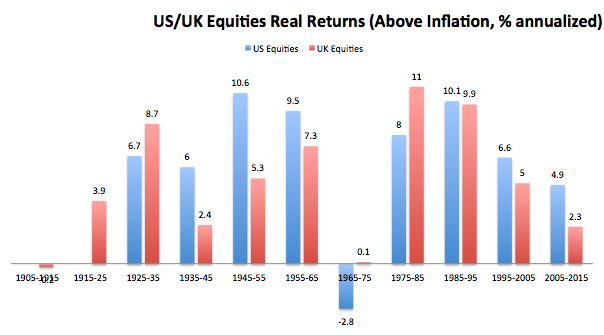Re-balance Cycle Reminder All MyPlanIQ’s newsletters are archived here.
For regular SAA and TAA portfolios, the next re-balance will be on Monday, November 28, 2016. You can also find the re-balance calendar for 2016 on ‘Dashboard‘ page once you log in.
As a reminder to expert users: advanced portfolios are still re-balanced based on their original re-balance schedules and they are not the same as those used in Strategic and Tactical Asset Allocation (SAA and TAA) portfolios of a plan.
Please note that we now list the next re-balance date on every portfolio page.
Economy Power And Long Term Stock Returns
The recent US presidential election is coming to its final days. However, its unusual bitterness and sharp divisiveness among voters have been very discouraging. Many are disappointed by the slow economy growth. Some even hold that the US economy power has declined and the country is on the verge of losing its dominant number one position in the world, economically or politically.
Naturally, investors are concerned about their investment returns, especially in such a depressing state (certainly, this is a subjective view). However, putting the economic, political and even military issues aside, if investors look at the investment history, things are much brighter in a long term.
Long term UK stock returns
The United Kingdom was the number one economic power house in the world before World War I. It gradually lost the title to the US in the two world war periods. By the end of World War II, the US emerged solidly as the number one economy power house in the world. Many investors would expect that in the past 50 or 100 years, the US equity returns would be higher (or much higher) than that in UK, given the common sense of winners and losers. Well, in this case, they are wrong.
The following data are taken from Barclays annual UK Equity Gilt Study 2016 that was published in March 2016.
UK Asset Class Real Returns
US Asset Class Real Returns
Real investment returns are the extra returns over inflation. Though UK equities had a lower returns in the past 20 and 10 years, they actually had a better returns in the past 50 years, compared with the US. The following chart shows the returns for each decade:
In fact, since World War II, UK equities had better returns from 1965 to 1985. In essence, it’s hard to argue that their returns are worse than the US’s even after it ‘declined’ and ceded its number position to the US.
Risk premium in a fair capital market
Though one can offer many reasons why this is the case, we have maintained that equity investments should command a risk premium over cash and even safer investments such as bonds. What that means is that regardless of the macro economic situation, company stocks should give investors (their owners) a better return. since a company owner would demand higher returns compared with just simply putting money into a bank: otherwise, the owner would just simply closes the company and get similar or better returns in a bank without much risk and work, for example. In aggregate, equities in general should return more than cash or even safer fixed income.
The other important factor is that a stock market index automatically functions as a filter to eliminate bad companies that are losing money or have little profit. For example, the famed S&P 500 index has strict criteria to select companies to be included in the index. Even the broad stock market acts as the first line of filtering: companies that have lost a great deal of business and money will be delisted off the exchanges.
Of course, the above assertions hinge on a fair capital market with less manipulation. The same argument for positive long term stock returns does not apply to those countries that are corrupted or have a manipulated market.
Even though the US economy and its political system are now facing difficulties, we are still optimistic on their long term future. This is because a democratic system like the one in the US, though not optimal or not without drawbacks, can correct itself in a long period of time. Furthermore, the US companies are still some of the most competitive in the world. Even if the US presidential election may result in a set back to their business, we view this as a short term issue. Finally, the history of UK equity returns can only give us even stronger conviction on the positive long term stock returns.
Market Overview
The good news in Q3 earnings continues: as of last Friday, Factset reports that the blended (combined with 58% already reported and 42% expected) earnings growth rate for the S&P 500 is 1.6%, compared with the expected -2.2% year over year decline. If the trend holds, that would mark the first positive earnings growth since 2015. Furthermore, the blended revenue growth rate for Q3 2016 is 2.7%. We view this is significant as we are always skeptical on earnings that can be financial engineered. For revenues, the numbers are better harder to fudge or they are much cleaner.
On the other hand, stocks have been volatile. The chaos in the presidential election only makes this worse. Furthermore, high yield bonds have started to experience a noticeable outflow and weakness, ditto other rate sensitive assets including REITs. The worst scenario would be a rising inflation environment with an anemic economy growth (the so called stagflation). This would force the Federal Reserve to raise interest rate, only to jeopardize the already weak recovery. In terms of investments, this would be bad for both stocks and bonds.
As always, we will stay on course and respond based on our strategies.
For more detailed asset trend scores, please refer to 360° Market Overview.
The current nasty presidential election is a reflection to the long standing reality facing Americans and others: since the financial crisis in 2008-2009, not much substantial structural change in the U.S., European and emerging market economies has taken place. Economies have heavily relied on low interest debts. Capital might be misallocated to unproductive investments and consumption. In terms of investments, U.S. stock valuation is at a historically high level. It is thus not a good time to take excessive risk. However, we remain optimistic on U.S. economy in the long term and believe much better investment opportunities will arise in the future.
We again would like to stress for any new investor and new money, the best way to step into this kind of markets is through dollar cost average (DCA), i.e. invest and/or follow a model portfolio in several phases (such as 2 or 3 months) instead of the whole sum at one shot.
Latest Articles
- October 24, 2016: Current Commodity Trend And Managed Futures
- October 17, 2016: Investment Mistakes And Good Or Bad Investment Strategies
- October 10, 2016: Momentum Investing Review
- October 3, 2016: Survey & Feedback
- September 26, 2016: Fixed Income Investing: Actively Managed Funds vs. Index Funds
- September 19, 2016: Stock Investing: Actively Managed Funds vs. Index Funds
- September 12, 2016: Newsletter Update
- September 5, 2016: Overvalued Markets And Long Term Timing Strategies
- August 29, 2016: Your 401K Finally Draws Attention
- August 22, 2016: Inflation Protected Securities TIPS For Current Overvalued Markets
- August 15, 2016: Risk On: Emerging Market Stocks And Small Cap Stocks
- August 8, 2016: Portfolio Construction Using Stock ETFs And Bond Mutual Funds
- August 1, 2016: Adding Value To Your Own Investments
- July 25, 2016: Tactical Asset Allocation Funds Review
- July 18, 2016: Strategic Asset Allocation & Lazy Portfolio Review
- July 11, 2016: Asset Trend Review
- June 27, 2016: Secular Cycles For Tactical And Strategic Investment Strategies
- June 20, 2016: A World of Debt
- June 13, 2016: Managed Futures For Portfolio Building
- June 6, 2016: Newsletter Summary
- May 30, 2016: Swensen Portfolio And Permanent Portfolios
- May 23, 2016: AAII Article And Some Web Changes
- May 16, 2016: The PIMCO (Dis)Advantages
- May 9, 2016: Boost Your Dull Summer Investments
- May 2, 2016: Low Cost Index Fund Investing
- April 25, 2016: Tax Free Municipal Bond Funds & Portfolios
- April 18, 2016: Asset Class Trend Review
- April 11, 2016: Construction of Sound And Conservative Portfolios
- March 28, 2016: Total Return Bond ETFs Review
- March 21, 2016: Small And Large Company Stock Performance In Different Economic Expansion Cycles
- March 14, 2016: Are Tactical And Timing Strategies Losing Steam?
- March 7, 2016: Defined Maturity Bond Fund Analysis
- February 29, 2016: Smart Strategic Asset Allocation Rebalance When Market Trend Changes
- February 22, 2016: Be Cash Smart
- February 15, 2016: Bond ETF Portfolios
- February 8, 2016: Newsletter Collection Update
- February 1, 2016: Total Return Bond Fund Portfolios In A Volatile Period
- January 25, 2016: Alternative Portfolios Review
- January 18, 2016: Strategic Asset Allocation: A Cautious Outlook
- January 11, 2016: Review Of Trend Following Tactical Asset Allocation
- January 4, 2016: What Worked And Didn’t In 2015
- December 21, 2015: Distressed Assets
- December 14, 2015: High Yield Bonds And Their Correlation With Stocks
- December 7, 2015: Diversification And Global Allocation
- November 30, 2015: Investors and Speculators Combined
- November 23, 2015: Active Stock Fund Performance Consistency
- November 16, 2015: Permanent, Risk Parity And Alternative Portfolios Review
- November 9, 2015: Broad Base Core Mutual Fund Review
- November 2, 2015: Broad Base Index Core ETFs Review
- October 26, 2015: Total Return Bond Fund Review
- October 19, 2015: Advanced Portfolio Review
- October 12, 2015: What About Commodities?
- October 5, 2015: Core Satellite Portfolios In A 401k Account
- September 28, 2015: Risk Managed Strategic Asset Allocation Portfolios Revisited
- September 21, 2015: Quest For The Best Investment Strategy
- September 14, 2015: Core Satellite Portfolios In Market Turmoil
- September 7, 2015: Market Rout Creates An Opportunity to Reposition Your Portfolios
- August 31, 2015: Review of Asset Allocation Funds and Portfolios
- August 24, 2015: Market Rout And Your Portfolios
- August 17, 2015: ETF or Mutual Fund Based Portfolios
- August 10, 2015: Updated Newsletter Collection
- August 3, 2015: Slippery Asset Trends
- July 27, 2015: Performance Dispersion Among Momentum Based Portfolios
- July 20, 2015: Global Balanced Portfolio Benchmarks
- July 13, 2015: Pain in Tactical Portfolios
- July 6, 2015: Fixed Income Total Return Bond Funds In Strategic Asset Allocation Portfolios
- June 29, 2015: Core ETF Commission Free Portfolios
- June 22, 2015: Secular Asset Trends
- June 15, 2015: Giving Up Bonds?
- June 1, 2015: Summer Blues?
- May 26, 2015: Cash, Bonds and Stocks In A Rising Rate Environment
- May 18, 2015: Portfolio Update
- May 11, 2015: Pain in Fixed Income?
- May 4, 2015: The Balanced Stock and Long Term Treasury Bond Portfolios
- April 27, 2015: Long Term Treasury Bond Behavior
- April 20, 2015: 529 College Savings Plan Rebalance Policy Change
- April 13, 2015: Total Return Bond Funds As Smart Cash
- April 6, 2015: The Low Return Environment
- March 30, 2015: Brokerage Specific Core Mutual Fund Portfolios 2
- March 23, 2015: Investment Arithmetic for Long Term Investments
- March 16, 2015: Brokerage Specific Core Mutual Fund Portfolios
- March 9, 2015: Newsletter Collection Update
- March 2, 2015: Total Return Bond ETFs
- February 23, 2015: Why Is Global Tactical Asset Allocation Not Popular?
- February 16, 2015: Where Are Permanent Portfolios Going?
- February 9, 2015: How Have Asset Allocation Funds Done?
- February 2, 2015: Risk Management Everywhere
- January 26, 2015: Composite Portfolios Review
- January 19, 2015: Fixed Income Investing Review
- January 12, 2015: How Does Trend Following Tactical Asset Allocation Strategy Deliver Returns
- January 5, 2015: When Forecast Fails
- December 22, 2014: Long Term Asset Returns: How Long Is Long?
- December 15, 2014: Beaten Down Assets
- December 8, 2014: Implementing Core Asset Portfolios In a Brokerage
- December 1, 2014: Two Key Issues of Investment Strategies
- November 24, 2014: Holiday Readings
- November 17, 2014: Retirement Spending Portfolios Update
- November 10, 2014: Fixed Income Or Cash
- November 3, 2014: Asset Trend Review
- October 27, 2014: Investment Loss, Mistakes And Market Cycles
- October 20, 2014: Strategic Portfolios With Managed Volatility
- October 13, 2014: Embrace Volatility
- October 6, 2014: Tips For 401k Open Enrollment
- September 29, 2014: What Can We Learn From Bill Gross’ Departure From PIMCO?
- September 22, 2014: Why Total Return Bond Funds?
- September 15, 2014: Equity And Total Return Bond Fund Composite Portfolios
- September 8, 2014: Momentum Based Portfolios Review
- September 1, 2014: Risk & Diversification: Mint.com Interview
- August 25, 2014: Remember Risk
- August 18, 2014: Consistency, The Most Important Edge In Investing: Tactical Case
- August 11, 2014: What To Do In Overvalued Stock Markets
- August 4, 2014: Is This The Peak Or Correction?
- July 28, 2014: Stock Musings
- July 21, 2014: Permanent Portfolios & Four Pillar Foundation Based Framework
- July 14, 2014: Composite Portfolios Review
- July 7, 2014: Portfolio Behavior During Market Corrections
- June 30, 2014: Half Year Brokerage ETF and Mutual Fund Portfolios Review
- June 23, 2014: Newsletter Collection Update
- June 16, 2014: There Are Always Lottery Winners
- June 9, 2014: The Arithmetic of Investment Mistakes
- June 2, 2014: Tips On Portfolio Rebalance
- May 26, 2014: In Praise Of Low Cost Core Asset Class Based Portfolios
- May 19, 2014: Consistency, The Most Important Edge In Investing: Strategic Case
- May 12, 2014: How To Handle An Elevated Overvalued Market
- May 5, 2014: Asset Allocation Funds Review
- April 28, 2014: Now The Economy Backs To The ‘Old Normal’, Should Our Investments Too?
- April 21, 2014: Total Return Bond Investing In The Current Market Environment
Enjoy Newsletter
How can we improve this newsletter? Please take our survey
–Thanks to those who have already contributed — we appreciate it.





 Diversified Asset Allocation Portfolios For Your Plans
Diversified Asset Allocation Portfolios For Your Plans
